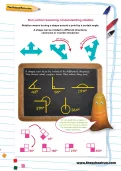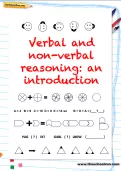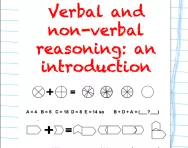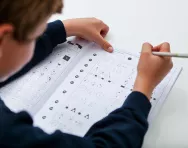TheSchoolRun.com closure date
As we informed you a few months ago, TheSchoolRun has had to make the difficult decision to close due to financial pressures and the company has now ceased trading. We had hoped to keep our content available through a partnership with another educational provider, but this provider has since withdrawn from the agreement.
As a result, we now have to permanently close TheSchoolRun.com. However, to give subscribers time to download any content they’d like to keep, we will keep the website open until 31st July 2025. After this date, the site will be taken down and there will be no further access to any resources. We strongly encourage you to download and save any resources you think you may want to use in the future.
In particular, we suggest downloading:
- Learning packs
- All the worksheets from the 11+ programme, if you are following this with your child
- Complete Learning Journey programmes (the packs below include all 40 worksheets for each programme)
You should already have received 16 primary school eBooks (worth £108.84) to download and keep. If you haven’t received these, please contact us at [email protected] before 31st July 2025, and we will send them to you.
We are very sorry that there is no way to continue offering access to resources and sincerely apologise for the inconvenience caused.
8 facts all parents should know about the 11+ exam

1. The 11+ exam isn't covered in the national curriculum
There are four possible disciplines that can be tested during the 11+ exam: verbal reasoning, non-verbal reasoning, maths and English. Verbal reasoning and non-verbal reasoning aren’t directly taught as part of the National Curriculum, but are thought to give a good indication of your child’s potential and how well they can solve problems.


Prepare Your Child For The 11+ Exam
- Essential 11+ English and maths skills
- Verbal and non-verbal reasoning questions
- Reading comprehension & CLOZE test worksheets
2. There's no 11+ coaching at school
Local authority primary schools are told they shouldn’t ‘teach to the test’, which means not preparing or coaching children for the exam. Fee-paying schools, of course, are free to do this.
3. Parents spend up to £1800 on 11+ tutors
There’s a growing trend for parents to pay for tutors to coach their children through the 11+: recent research suggested that up to half of pupils could receive coaching, with parents spending up to £1,800. Recently this has caused concern among experts, with some drawing attention to the fact that if children are ‘over-coached’ they may well pass the test, but struggle to keep up when they get to their next school. There are now calls for the 11+ to be made ‘tutor-proof’.
4. The pass mark changes every year
There’s a chance that the pass mark in your area will be different every year. In the Kent 11+ test, for example, it’s set taking into account what children score on the test. So the pass mark for the year is higher if a large percentage of pupils do well and get high scores, and lower if many score low.
5. There are no official 11+ past papers
You can get hold of past practice papers for SATs, GCSEs and A levels, but not for 11+.
Most of the 11+ test in England are produced by GL Assessment or CEM, the Centre for Evaluation and Monitoring at the University of Durham. The testing organisations don’t supply past papers for practice directly. Instead, there are practice papers and mock tests available commercially online (for verbal and non-verbal reasoning practice questions see our subscriber-only learning pack).
6. SEN children can be entitled to additional help
If your child has special educational needs, they might be entitled to special arrangements when they sit the test. This could include extra time and papers in larger fonts.
7. Passing the 11+ doesn't mean a guaranteed grammar school place
If your child misses the pass mark and you’re unhappy with the result, you can ask for their papers to be remarked and enter an appeals process.
Unfortunately, even if your child does pass the 11+, there’s no guarantee they’ll get a place at one of England’s 164 grammar schools. Competition is extremely fierce, and some schools have seen up to 13 pupils apply for each place available. If a school is over-subscribed, priority goes to certain groups of children as per the Department of Education’s School Admissions Code, for example children in care and those with a statement of special needs.
Taking the 11+ can be a really stressful time for both you and your child. Even if you try to stay low-key about the process, chances are they’ll pick up on anxieties of other classmates. It might seem like there’s a lot riding on the exam, but try to keep your sense of perspective – and do all you can to reassure them that they’re bound to enjoy, and do well at, whichever school they end up going to next year.
8. Children can also take the 12+ (or Late Transfer Test)
If your child didn’t qualify for a grammar school under the 11+, and you truly believe they’re suited to that kind of school, there could be an option to take the 12+ (also known as the ‘Late Transfer Test’). Unfortunately, passing this gives no guarantee of them getting a place at a grammar school as all the places may have been allocated already.








